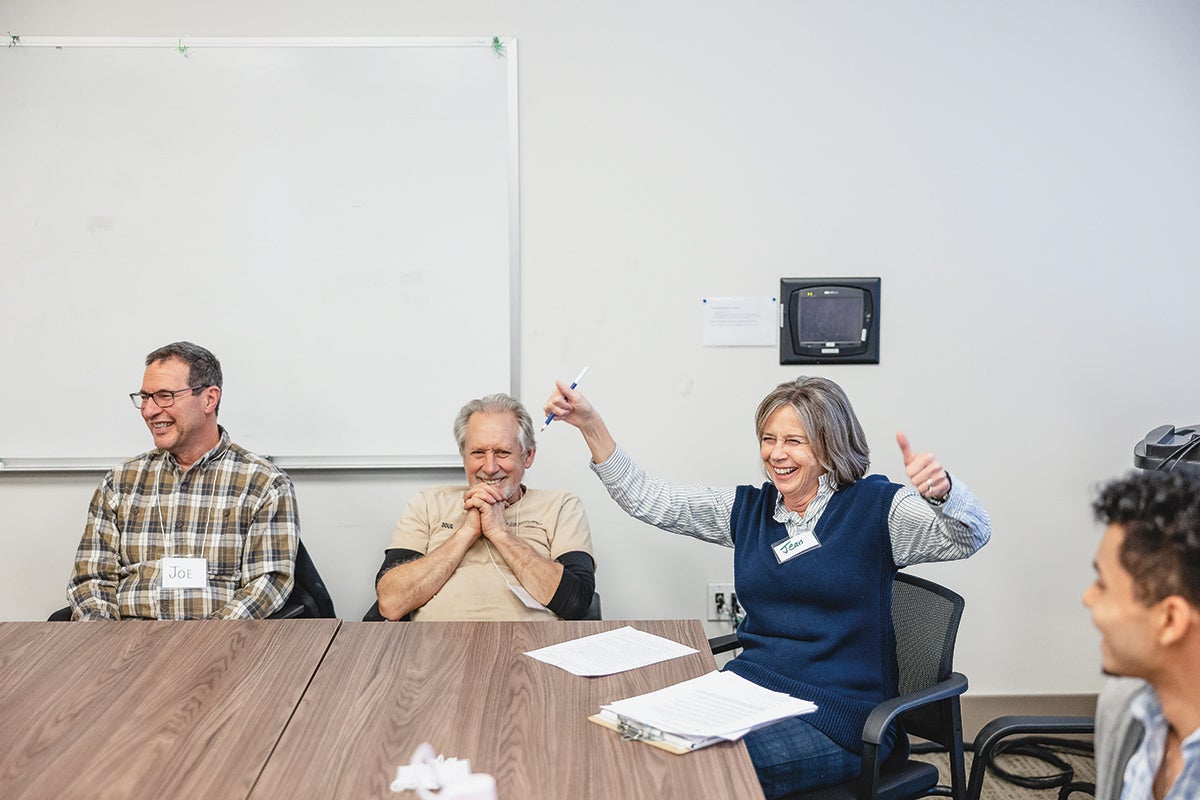Case Western Psychological Sciences faculty conduct cutting edge interdisciplinary research on the brain, memory, behaviors, speech, swallowing, clinical disorders, learning, expertise, play, perception, and many other topics. We encourage students to become involved in research, especially those who plan to go on to graduate school in psychology. Research experience provides students with the opportunity to learn more about the scientific process and to get to know faculty members and graduate students in the department better. Additionally, research assistant experience provides opportunities for faculty to know you and write letters of recommendation on your behalf. Some research experiences can even sometimes result in student authorship on papers and conference presentations, both of which are helpful if one wants to pursue graduate school.
To learn more about faculty members’ research topics, please see their profiles.
 Research Methods Class
Research Methods Class
We recommend that all psychology and communication sciences majors take Research Methods, PSCL375 during their time at CWRU. This course teaches you foundational information about conducting a literature search, evaluating the scientific merit of existing research, creating hypotheses, and designing studies. The course is offered in a small seminar and involves a large number of exercises and experiential learning. Research Methods is also a pre-requisite for many of the department’s Capstone courses.
Research Assistant Experience
If you are interested in becoming more involved in research, please look at the faculty profiles and contact professors whose research interests you via email. Please send professors your unofficial transcript and CV/resume if you have one. Due to the large number of students who want to serve as a research assistant, it sometimes takes several semesters to find a lab with available research assistant slots. Don’t give up! We highly encourage you to take this opportunity to learn more about research
Looking to be a participant in research?
Please see the SONA system for students in PSCL101 and PSCL375.
Research News
Connecting—With and Without Words Fostering communication and community for people with neurogenic disorders
Every Monday, nearly 35 people come together for a program on the edge of campus, drawn by camaraderie, a compassionate environment and a desire to communicate better as they live with a nervous-system disorder that makes speaking difficult. For years, many members of this Case Western Reserve University program, known...
Lauren Calandruccio receives 2025 CAPCSD Excellence in Diversity Award
Professor of Communication Sciences Lauren Calandruccio and her collaborator Jessica Sullivan, assistant professor at Hampton University, have been named recipients of the 2025 Council of Academic Programs in Communication Sciences and Disorders (CAPCSD) Excellence in Diversity Award. This award recognizes outstanding contributions to the field of communication sciences and disorders,...
Congratulations Guanyu Wei and Cassandra Lopez for receiving a CWRU CAS GSSCE Award!
Both Wei and Cassandra, first year PhD students in COSI, were notified on Friday that they received a CAS GSSCE Award from the Office of the Dean in the amount of $1000 each to support their research. The COSI faculty are extremely proud of these students for not only submitting their...
Helen Long brings a lifetime desire to help children to CWRU
Helen Long grew up wanting to help children hear and to be heard … and she’s doing just that. Long, an assistant professor in the communication sciences program of the Department of Psychological Sciences, has known since the age of five that she wanted to be a speech-language pathologist (SLP)....
Meet new faculty member in the College of Arts and Sciences
Helen L. Long Assistant Professor Psychological Sciences Helen L. Long Though Helen Long knew she wanted to be a speech-language-pathologist as a child, it wasn’t until she began working in the field that she realized her true passion was for research. With a PhD from the University of Memphis, a master’s from Florida...
WE’RE HIRING! Developmental Psychology Assistant Professor Position
For more information and to apply: https://apply.interfolio.com/153281. Review of applications begins November 1, 2024, and will continue until the position is filled.





